- Home
- Fyodor Dostoyevsky
Poor Folk Anthology Page 3
Poor Folk Anthology Read online
Page 3
June 1st
MY BELOVED MAKAR ALEXIEVITCH,—So eager am I to do something that will please and divert you in return for your care, for your ceaseless efforts on my behalf—in short, for your love for me— that I have decided to beguile a leisure hour for you by delving into my locker, and extracting thence the manuscript which I send you herewith. I began it during the happier period of my life, and have continued it at intervals since. So often have you asked me about my former existence—about my mother, about Pokrovski, about my sojourn with Anna Thedorovna, about my more recent misfortunes; so often have you expressed an earnest desire to read the manuscript in which (God knows why) I have recorded certain incidents of my life, that I feel no doubt but that the sending of it will give you sincere pleasure. Yet somehow I feel depressed when I read it, for I seem now to have grown twice as old as I was when I penned its concluding lines. Ah, Makar Alexievitch, how weary I am—how this insomnia tortures me! Convalescence is indeed a hard thing to bear!
B. D.
ONE
UP to the age of fourteen, when my father died, my childhood was the happiest period of my life. It began very far away from here- in the depths of the province of Tula, where my father filled the position of steward on the vast estates of the Prince P—. Our house was situated in one of the Prince's villages, and we lived a quiet, obscure, but happy, life. A gay little child was I—my one idea being ceaselessly to run about the fields and the woods and the garden. No one ever gave me a thought, for my father was always occupied with business affairs, and my mother with her housekeeping. Nor did any one ever give me any lessons—a circumstance for which I was not sorry. At earliest dawn I would hie me to a pond or a copse, or to a hay or a harvest field, where the sun could warm me, and I could roam wherever I liked, and scratch my hands with bushes, and tear my clothes in pieces. For this I used to get blamed afterwards, but I did not care.
Had it befallen me never to quit that village—had it befallen me to remain for ever in that spot—I should always have been happy; but fate ordained that I should leave my birthplace even before my girlhood had come to an end. In short, I was only twelve years old when we removed to St. Petersburg. Ah! how it hurts me to recall the mournful gatherings before our departure, and to recall how bitterly I wept when the time came for us to say farewell to all that I had held so dear! I remember throwing myself upon my father's neck, and beseeching him with tears to stay in the country a little longer; but he bid me be silent, and my mother, adding her tears to mine, explained that business matters compelled us to go. As a matter of fact, old Prince P— had just died, and his heirs had dismissed my father from his post; whereupon, since he had a little money privately invested in St. Petersburg, he bethought him that his personal presence in the capital was necessary for the due management of his affairs. It was my mother who told me this. Consequently we settled here in St. Petersburg, and did not again move until my father died.
How difficult I found it to grow accustomed to my new life! At the time of our removal to St. Petersburg it was autumn—a season when, in the country, the weather is clear and keen and bright, all agricultural labour has come to an end, the great sheaves of corn are safely garnered in the byre, and the birds are flying hither and thither in clamorous flocks. Yes, at that season the country is joyous and fair, but here in St. Petersburg, at the time when we reached the city, we encountered nothing but rain, bitter autumn frosts, dull skies, ugliness, and crowds of strangers who looked hostile, discontented, and disposed to take offence. However, we managed to settle down—though I remember that in our new home there was much noise and confusion as we set the establishment in order. After this my father was seldom at home, and my mother had few spare moments; wherefore, I found myself forgotten.
The first morning after our arrival, when I awoke from sleep, how sad I felt! I could see that our windows looked out upon a drab space of wall, and that the street below was littered with filth. Passers-by were few, and as they walked they kept muffling themselves up against the cold.
Then there ensued days when dullness and depression reigned supreme. Scarcely a relative or an acquaintance did we possess in St. Petersburg, and even Anna Thedorovna and my father had come to loggerheads with one another, owing to the fact that he owed her money. In fact, our only visitors were business callers, and as a rule these came but to wrangle, to argue, and to raise a disturbance. Such visits would make my father look very discontented, and seem out of temper. For hours and hours he would pace the room with a frown on his face and a brooding silence on his lips. Even my mother did not dare address him at these times, while, for my own part, I used to sit reading quietly and humbly in a corner—not venturing to make a movement of any sort.
Three months after our arrival in St. Petersburg I was sent to a boarding-school. Here I found myself thrown among strange people; here everything was grim and uninviting, with teachers continually shouting at me, and my fellow-pupils for ever holding me up to derision, and myself constantly feeling awkward and uncouth. How strict, how exacting was the system! Appointed hours for everything, a common table, ever-insistent teachers! These things simply worried and tortured me. Never from the first could I sleep, but used to weep many a chill, weary night away. In the evenings everyone would have to repeat or to learn her lessons. As I crouched over a dialogue or a vocabulary, without daring even to stir, how my thoughts would turn to the chimney-corner at home, to my father, to my mother, to my old nurse, to the tales which the latter had been used to tell! How sad it all was! The memory of the merest trifle at home would please me, and I would think and think how nice things used to be at home. Once more I would be sitting in our little parlour at tea with my parents—in the familiar little parlour where everything was snug and warm! How ardently, how convulsively I would seem to be embracing my mother! Thus I would ponder, until at length tears of sorrow would softly gush forth and choke my bosom, and drive the lessons out of my head. For I never could master the tasks of the morrow; no matter how much my mistress and fellow-pupils might gird at me, no matter how much I might repeat my lessons over and over to myself, knowledge never came with the morning. Consequently, I used to be ordered the kneeling punishment, and given only one meal in the day. How dull and dispirited I used to feel! From the first my fellow-pupils used to tease and deride and mock me whenever I was saying my lessons. Also, they used to pinch me as we were on our way to dinner or tea, and to make groundless complaints of me to the head mistress. On the other hand, how heavenly it seemed when, on Saturday evening, my old nurse arrived to fetch me! How I would embrace the old woman in transports of joy! After dressing me, and wrapping me up, she would find that she could scarcely keep pace with me on the way home, so full was I of chatter and tales about one thing and another. Then, when I had arrived home merry and lighthearted, how fervently I would embrace my parents, as though I had not seen them for ten years. Such a fussing would there be—such a talking and a telling of tales! To everyone I would run with a greeting, and laugh, and giggle, and scamper about, and skip for very joy. True, my father and I used to have grave conversations about lessons and teachers and the French language and grammar; yet we were all very happy and contented together. Even now it thrills me to think of those moments. For my father's sake I tried hard to learn my lessons, for I could see that he was spending his last kopeck upon me, and himself subsisting God knows how. Every day he grew more morose and discontented and irritable; every day his character kept changing for the worse. He had suffered an influx of debts, nor were his business affairs prospering. As for my mother, she was afraid even to say a word, or to weep aloud, for fear of still further angering him. Gradually she sickened, grew thinner and thinner, and became taken with a painful cough. Whenever I reached home from school I would find every one low-spirited, and my mother shedding silent tears, and my father raging. Bickering and high words would arise, during which my father was wont to declare that, though he no longer derived the smallest pleasure or relaxation from li
fe, and had spent his last coin upon my education, I had not yet mastered the French language. In short, everything began to go wrong, to turn to unhappiness; and for that circumstance, my father took vengeance upon myself and my mother. How he could treat my poor mother so I cannot understand. It used to rend my heart to see her, so hollow were her cheeks becoming, so sunken her eyes, so hectic her face. But it was chiefly around myself that the disputes raged. Though beginning only with some trifle, they would soon go on to God knows what. Frequently, even I myself did not know to what they related. Anything and everything would enter into them, for my father would say that I was an utter dunce at the French language; that the head mistress of my school was a stupid, common sort of women who cared nothing for morals; that he (my father) had not yet succeeded in obtaining another post; that Lamonde's "Grammar" was a wretched book—even a worse one than Zapolski's; that a great deal of money had been squandered upon me; that it was clear that I was wasting my time in repeating dialogues and vocabularies; that I alone was at fault, and that I must answer for everything. Yet this did not arise from any WANT OF LOVE for me on the part of my father, but rather from the fact that he was incapable of putting himself in my own and my mother's place. It came of a defect of character.
All these cares and worries and disappointments tortured my poor father until he became moody and distrustful. Next he began to neglect his health. with the result that, catching a chill, he died, after a short illness, so suddenly and unexpectedly that for a few days we were almost beside ourselves with the shock — my mother, in particular, lying for a while in such a state of torpor that I had fears for her reason. The instant my father was dead creditors seemed to spring up out of the ground, and to assail us en masse. Everything that we possessed had to be surrendered to them, including a little house which my father had bought six months after our arrival in St. Petersburg. How matters were finally settled I do not know, but we found ourselves roofless, shelterless, and without a copper. My mother was grievously ill, and of means of subsistence we had none. Before us there loomed only ruin, sheer ruin. At the time I was fourteen years old. Soon afterwards Anna Thedorovna came to see us, saying that she was a lady of property and our relative; and this my mother confirmed—though, true, she added that Anna was only a very DISTANT relative. Anna had never taken the least notice of us during my father's lifetime, yet now she entered our presence with tears in her eyes, and an assurance that she meant to better our fortunes. Having condoled with us on our loss and destitute position, she added that my father had been to blame for everything, in that he had lived beyond his means, and taken upon himself more than he was able to perform. Also, she expressed a wish to draw closer to us, and to forget old scores; and when my mother explained that, for her own part, she harboured no resentment against Anna, the latter burst into tears, and, hurrying my mother away to church, then and there ordered Mass to be said for the "dear departed," as she called my father. In this manner she effected a solemn reconciliation with my mother.
Next, after long negotiations and vacillations, coupled with much vivid description of our destitute position, our desolation, and our helplessness, Anna invited us to pay her (as she expressed it) a "return visit." For this my mother duly thanked her, and considered the invitation for a while; after which, seeing that there was nothing else to be done, she informed Anna Thedorovna that she was prepared, gratefully, to accept her offer. Ah, how I remember the morning when we removed to Vassilievski Island! [A quarter of St. Petersburg.] It was a clear, dry, frosty morning in autumn. My mother could not restrain her tears, and I too felt depressed. Nay, my very heart seemed to be breaking under a strange, undefined load of sorrow. How terrible it all seemed! …
TWO
AT first—that is to say, until my mother and myself grew used to our new abode—we found living at Anna Thedorovna's both strange and disagreeable. The house was her own, and contained five rooms, three of which she shared with my orphaned cousin, Sasha (whom she had brought up from babyhood); a fourth was occupied by my mother and myself; and the fifth was rented of Anna by a poor student named Pokrovski. Although Anna lived in good style—in far better style than might have been expected—her means and her avocation were conjectural. Never was she at rest; never was she not busy with some mysterious something or other. Also, she possessed a wide and varied circle of friends. The stream of callers was perpetual—although God only knows who they were, or what their business was. No sooner did my mother hear the door- bell ring than off she would carry me to our own apartment. This greatly displeased Anna, who used again and again to assure my mother that we were too proud for our station in life. In fact, she would sulk for hours about it. At the time I could not understand these reproaches, and it was not until long afterwards that I learned—or rather, I guessed—why eventually my mother declared that she could not go on living with Anna. Yes, Anna was a bad woman. Never did she let us alone. As to the exact motive why she had asked us to come and share her house with her I am still in the dark. At first she was not altogether unkind to us but, later, she revealed to us her real character—as soon, that is to say, as she saw that we were at her mercy, and had nowhere else to go. Yes, in early days she was quite kind to me—even offensively so, but afterwards, I had to suffer as much as my mother. Constantly did Anna reproach us; constantly did she remind us of her benefactions, and introduce us to her friends as poor relatives of hers whom, out of goodness of heart and for the love of Christ, she had received into her bosom. At table, also, she would watch every mouthful that we took; and, if our appetite failed, immediately she would begin as before, and reiterate that we were over-dainty, that we must not assume that riches would mean happiness, and that we had better go and live by ourselves. Moreover, she never ceased to inveigh against my father—saying that he had sought to be better than other people, and thereby had brought himself to a bad end; that he had left his wife and daughter destitute; and that, but for the fact that we had happened to meet with a kind and sympathetic Christian soul, God alone knew where we should have laid our heads, save in the street. What did that woman not say? To hear her was not so much galling as disgusting. From time to time my mother would burst into tears, her health grew worse from day to day, and her body was becoming sheer skin and bone. All the while, too, we had to work—to work from morning till night, for we had contrived to obtain some employment as occasional sempstresses. This, however, did not please Anna, who used to tell us that there was no room in her house for a modiste's establishment. Yet we had to get clothes to wear, to provide for unforeseen expenses, and to have a little money at our disposal in case we should some day wish to remove elsewhere. Unfortunately, the strain undermined my mother's health, and she became gradually weaker. Sickness, like a cankerworm, was gnawing at her life, and dragging her towards the tomb. Well could I see what she was enduring, what she was suffering. Yes, it all lay open to my eyes.
Day succeeded day, and each day was like the last one. We lived a life as quiet as though we had been in the country. Anna herself grew quieter in proportion as she came to realise the extent of her power over us. In nothing did we dare to thwart her. From her portion of the house our apartment was divided by a corridor, while next to us (as mentioned above) dwelt a certain Pokrovski, who was engaged in teaching Sasha the French and German languages, as well as history and geography—"all the sciences," as Anna used to say. In return for these services he received free board and lodging. As for Sasha, she was a clever, but rude and uncouth, girl of thirteen. On one occasion Anna remarked to my mother that it might be as well if I also were to take some lessons, seeing that my education had been neglected at school; and, my mother joyfully assenting, I joined Sasha for a year in studying under this Pokrovski.
The latter was a poor—a very poor—young man whose health would not permit of his undertaking the regular university course. Indeed, it was only for form's sake that we called him "The Student." He lived in such a quiet, humble, retiring fashion that never a sou
nd reached us from his room. Also, his exterior was peculiar—he moved and walked awkwardly, and uttered his words in such a strange manner that at first I could never look at him without laughing. Sasha was for ever playing tricks upon him— more especially when he was giving us our lessons. But unfortunately, he was of a temperament as excitable as herself. Indeed, he was so irritable that the least trifle would send him into a frenzy, and set him shouting at us, and complaining of our conduct. Sometimes he would even rush away to his room before school hours were over, and sit there for days over his books, of which he had a store that was both rare and valuable. In addition, he acted as teacher at another establishment, and received payment for his services there; and, whenever he had received his fees for this extra work, he would hasten off and purchase more books.
In time I got to know and like him better, for in reality he was a good, worthy fellow—more so than any of the people with whom we otherwise came in contact. My mother in particular had a great respect for him, and, after herself, he was my best friend. But at first I was just an overgrown hoyden, and joined Sasha in playing the fool. For hours we would devise tricks to anger and distract him, for he looked extremely ridiculous when he was angry, and so diverted us the more (ashamed though I am now to admit it). But once, when we had driven him nearly to tears, I heard him say to himself under his breath, "What cruel children!" and instantly I repented—I began to feel sad and ashamed and sorry for him. I reddened to my ears, and begged him, almost with tears, not to mind us, nor to take offence at our stupid jests. Nevertheless, without finishing the lesson, he closed his book, and departed to his own room. All that day I felt torn with remorse. To think that we two children had forced him, the poor, the unhappy one, to remember his hard lot! And at night I could not sleep for grief and regret. Remorse is said to bring relief to the soul, but it is not so. How far my grief was internally connected with my conceit I do not know, but at least I did not wish him to think me a baby, seeing that I had now reached the age of fifteen years. Therefore, from that day onwards I began to torture my imagination with devising a thousand schemes which should compel Pokrovski to alter his opinion of me. At the same time, being yet shy and reserved by nature, I ended by finding that, in my present position, I could make up my mind to nothing but vague dreams (and such dreams I had). However, I ceased to join Sasha in playing the fool, while Pokrovski, for his part, ceased to lose his temper with us so much. Unfortunately this was not enough to satisfy my self-esteem.

 The Eternal Husband
The Eternal Husband Crime and Punishment
Crime and Punishment The Brothers Karamazov
The Brothers Karamazov Notes From Underground
Notes From Underground The Idiot
The Idiot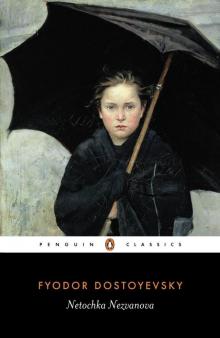 Netochka Nezvanova (Penguin ed.)
Netochka Nezvanova (Penguin ed.)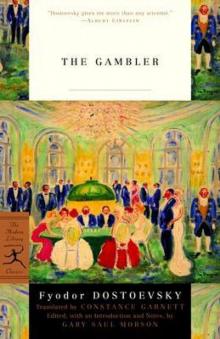 The Gambler
The Gambler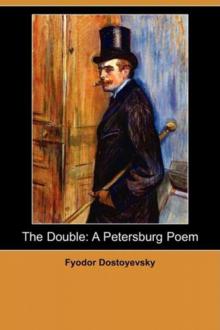 The Double
The Double Poor Folk Anthology
Poor Folk Anthology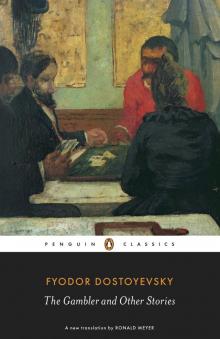 The Gambler and Other Stories (Penguin ed.)
The Gambler and Other Stories (Penguin ed.) Prestuplenie i nakazanie. English
Prestuplenie i nakazanie. English Notes from the Underground
Notes from the Underground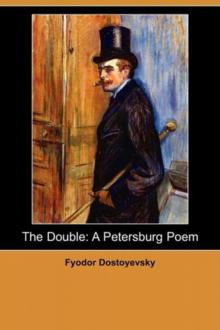 The Double: A Petersburg Poem
The Double: A Petersburg Poem White Nights and Other Stories / The Novels of Fyodor Dostoevsky, Volume X
White Nights and Other Stories / The Novels of Fyodor Dostoevsky, Volume X Complete Works of Fyodor Dostoyevsky
Complete Works of Fyodor Dostoyevsky Poor Folk and Other Stories
Poor Folk and Other Stories The House of the Dead
The House of the Dead